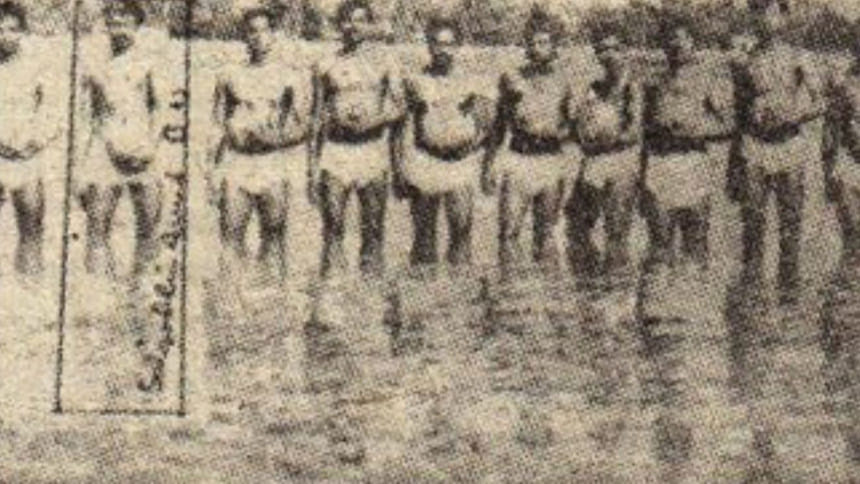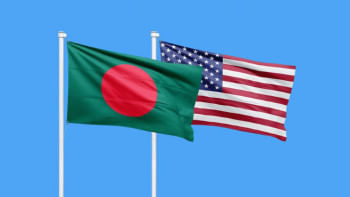Naval Commandos in the Liberation War

AUGUST 15, 1971. On that day, after midnight, then East Pakistan's sea and river ports were attacked with mines one after the other. Occupation forces, shaken, sent out SOS signals to the whole world. The attack by the first naval force formed under the Bangladesh government operating outside the country resulted in goods and warships belonging to the occupation forces and other countries sinking one after the other. Immediately, the ego of the undefeated, mighty Pakistan armed forces was shattered. In the Liberation War, this was a surprise to the whole world. Success of the naval operation added a new momentum to the Liberation War.
On the night of March 25, 1971 when Pakistani occupation forces started carrying out genocide in this country, professional training in France's submarine was being given to 57 Pakistani naval personnel, 13 of whom were Bengalis. With the intention of freeing the country, 8 of the 13 courageous Bengalis deserted the Pakistanis to take part in the Liberation War and arrived in India with political asylum. This was the first pro-Liberation mutiny in the Bengali armed forces based abroad. These eight extremely brave sailors are: Commando Mohammad Rahmatullah, Bir Protik, Commando Syed Mosharrof Hossen, Commando Aminullah Sheikh, Bir Bikram, Commando Mohammad Badiul Alam, Bir Uttam, Commando Abdul Wahid Chowdhury, Bir Uttam and Bir Bikram, Commando Mohammad Ahsan Ullah, Bir Protik, Shaheed Commando Abdur Rakib Mia, Bir Bikram. He was martyred in a mine attack on a moving ship in Fulchari Ghat, Commando Abidur Rahman, Bir Bikram.
On April 10, these 8 Bengali war heroes, due to their indomitable passion and unquestionable patriotism, reached Delhi. Indian Naval Chief, senior officers of the Indian military and the Commander-in-Chief during Liberation War, General Osmani -- with the advice of Late Tajuddin Ahmed, the first prime minister of the interim government of Bangladesh -- accepted a plan to form a naval commando force. In order to execute the plan, these eight submariners first underwent a short-term commando training under the Indian navy in Delhi. After that, with plans to form a small but effective commando force and with the help of the Indian army and Indian navy, Bengali youths were selected from different transit camps in India. The training camp for this naval commando force was first set up at Palashi in Nodiya district of West Bengal. This was the place of the historic fight between Nawab Siraj ud-Daulah and Lord Clive by the river Bhagirathi.
Bangladesh in my heart
357 youths for the first batch were selected and assembled for training at Palashi. From the very start of camp training, Lieutenant Commander G.M. Martis of the Indian navy sent out a loud and clear message that this team of naval commandos would be a suicide squad. Therefore, one had to be extremely brave and patriotic to be a part of this team. He also said that only those who were ready to sacrifice their lives to attain independence for the country should attend this training, and sign and submit an acknowledgment bond. Afterwards, 180 out of these expressed their unwillingness to continue with the training. Later, an additional 17 trainees failed to complete the training course. 160 youths of the first batch completed this gruesome commando training with extreme hard work and passion.
Under high level of secrecy, 148 of the 160 were divided into four groups for the operation. Between August 4 and 6, all these commandos were dispatched to four internal ports of Bangladesh to destroy ships berthed there. The day of the first attack was August 15. This attack by the naval commandos is known as the famous "Operation Jackpot."
The tremendous success of this attack encouraged and boosted the morale of the war planners who, as part of the long-time preparation for the Liberation War, formed another two commando teams consisting of a total of 499 trainees to make up an invincible commando force. Until the very last day prior to independence, these naval commandos fought the enemy forces with extreme precision and bravery. As a result, this attack by the naval commandos was acknowledged by the international community.
On October 5, 1971, in a speech to the UN, the leader of the Pakistani team Mahmud Ali, and on October 12 in a speech to the nation, Pakistani President General Yahya Khan, admitted the havoc caused by the destruction of the ships and the harmful effects on the transportation sector. Even the US State Department acknowledged the destruction caused by the shipwrecks due to the naval commando attacks.
Bangladesh being a riverine country, the main motive for the commando attack was to disrupt the maritime communication between Bangladesh and Pakistan. This is when the Pakistani government tried to broadcast through the international media that East Pakistan was in a normal state, and that there was no Liberation War going on. After the fearless attack carried out by the naval commandos on August 15, the Pakistani forces were shaken up. News of the naval attack spread throughout the world. The Liberation War got international attention. On the other side of the world, as the news spread, the freedom fighters were even more encouraged, and it added a new dimension to the Liberation War.
Commander-in-Chief of Liberation War declared S.S. Lightning as war 'prize'
Right after independence, the first example of a pro-Pakistani attitude was set by General Ziaur by giving an American ship named S.S. Lightning to a Pakistani for free. On August 16, 1971, naval commandos had destroyed five foreign ships at Mongla. At the time, the American ship belonging to M/S Inco Shipping Corporation carried weapons and artillery to Mongla port. On August 16, the countrywide attack by naval commandos destroyed 26 ships. In the nine months of the Liberation War, the valiant suicide squad of naval commandos used mines to sink more than 100 Pakistani and other foreign ships near Bangladesh's coastal areas.
American M/S Inco Shipping Corporation, the real owner of S.S. Lighting, was contacted repeatedly (for removing their ship as a part of clearance of the river ports) but there was no response. In 1974, then Shipping and Transportation minister and Commander-in-Chief during Liberation War, General M.A.G. Osmani, declared the ship as war 'prize' (national treasure obtained during the war). Without obtaining indemnity bond from the admiralty court, on March 1976, authorities of maritime operations donated a ship worth six crores to a Pakistani, Mohammad Bhai at the address 41, Jubilee Road, Chittagong. This ship was given to M/S Ship Scrap Traders without paying the due of Tk. 20,33,542 to Khulna shipyard.
This ship, earned in the Liberation War, became a national treasure. It was a symbol of pride for the Liberation War. People of the country have the right to know why the fact that the ship was declared as war prize by the Commander-in-Chief and promised to the naval commandos by Bangabandhu was overlooked whilst an asset worth six crores was handed over to a Pakistani for free. The naval commandos want to know the fate of the other ships that were sunk within our maritime boundaries at the cost of the blood of the glorious sons of the country, our freedom fighters.
Source: Shommukh Shomore Bangali, Edited by Rafiqul Islam, Agami Prokashoni, February, 1999.
Translated by Nahela Nowshin of The Daily Star.

 For all latest news, follow The Daily Star's Google News channel.
For all latest news, follow The Daily Star's Google News channel. 



Comments